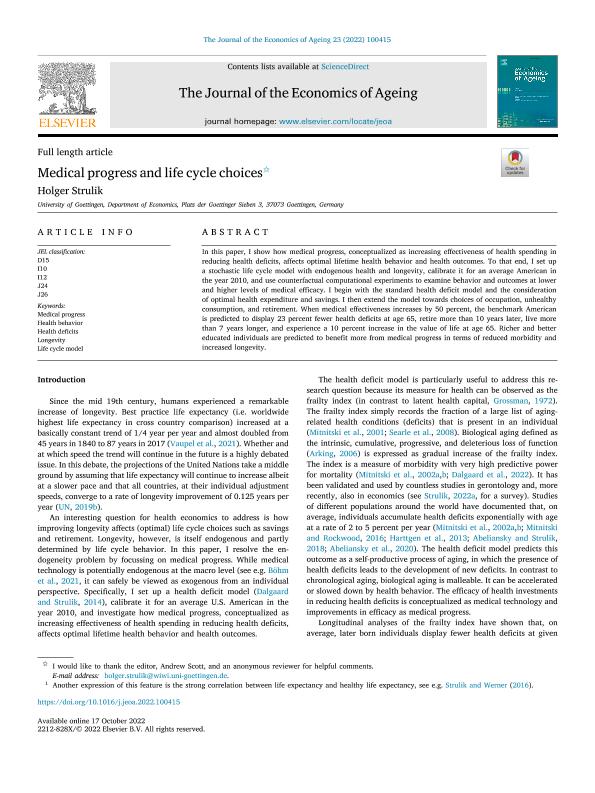Medical progress and life cycle choices

Contenido multimedia no disponible por derechos de autor o por acceso restringido. Contacte con la institución para más información.
| Tag | 1 | 2 | Valor |
|---|---|---|---|
| LDR | 00000cab a2200000 4500 | ||
| 001 | MAP20220034548 | ||
| 003 | MAP | ||
| 005 | 20221122144418.0 | ||
| 008 | 221122e20221031esp|||p |0|||b|spa d | ||
| 040 | $aMAP$bspa$dMAP | ||
| 084 | $a931.2 | ||
| 100 | 1 | $0MAPA20210005244$aStrulik, Holger | |
| 245 | 1 | 0 | $aMedical progress and life cycle choices |
| 520 | $aIn this paper, I show how medical progress, conceptualized as increasing effectiveness of health spending in reducing health deficits, affects optimal lifetime health behavior and health outcomes. To that end, I set up a stochastic life cycle model with endogenous health and longevity, calibrate it for an average American in the year 2010, and use counterfactual computational experiments to examine behavior and outcomes at lower and higher levels of medical efficacy. I begin with the standard health deficit model and the consideration of optimal health expenditure and savings. I then extend the model towards choices of occupation, unhealthy consumption, and retirement. When medical effectiveness increases by 50 percent, the benchmark American is predicted to display 23 percent fewer health deficits at age 65, retire more than 10 years later, live more than 7 years longer, and experience a 10 percent increase in the value of life at age 65. Richer and better educated individuals are predicted to benefit more from medical progress in terms of reduced morbidity and increased longevity. | ||
| 650 | 4 | $0MAPA20080571498$aCalidad de vida | |
| 650 | 4 | $0MAPA20080588533$aTratamiento médico | |
| 650 | 4 | $0MAPA20080555016$aLongevidad | |
| 773 | 0 | $wMAP20210010194$g31/10/2022 Volumen 23 - 2022 , 12 p.$tThe Journal of the economics of ageing $dOxford : Elsevier ScienceDirect, 2021- |

